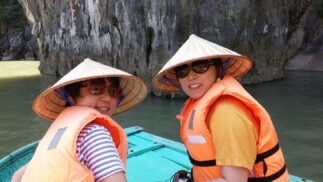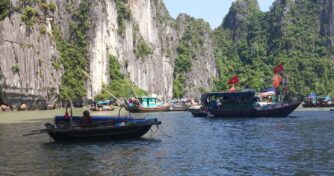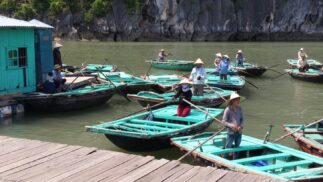Vietnam is a fascinating place, many contrasts and different environments and Ha Long Bay is one of its jewels. And, Vietnam one of the few places where we arranged a tour so we wouldn’t get lost. I planned a rather detailed itinerary that included quite a few travel arrangements. Very little English is spoken here outside of tourist services.
From Hanoi in the northwest, Gene and I took a 3.5 hour van ride to Ha Long Bay Marina in the northeast where we boarded a nice, smaller boat with 30 people. At our table we sat with two sisters from South Korea who didn’t speak English but we communicated pretty well, and we hung out together, and a man from the Philadelphia area who has been living in Asia, and now Hanoi, for 10 years, and his girlfriend from the Philippines. We enjoyed a lovely traditional Vietnamese lunch and beer.
Ha Long Bay has over 2000 limestone islands that rise out of the Gulf of Tonkin off the east coast of North Vietnam. Their name “‘Halong’ translates to ‘where the dragon descends into the sea’. The legend claims the islands of Halong Bay were created by a great dragon from the mountains. As it charged towards the coast, its flailing tail gouged out valleys and crevasses. When it finally plunged into the sea, the area filled with water, leaving only the pinnacles visible.”
Designated a World Heritage site in 1994, these beautiful waters and their islands have amazing caves, beaches, and other fascinating geologic features, and floating villages that hug these islands. On our relatively short boat trip of a half day (some trips are 2-3 days long) we cruised through the passages and by floating boat villages to an enormous and impressive cave. There are many bays around Ha Long Bay with hundreds of floating villages made up of individual boats, often several attached together, where families live, kids go to floating schools, and they engage in other typical activities. Families primarily fish, but they are also employed by the small cruise boat operators, and some have B&B’s where tourists can stay on village boats. Tourism is the main revenue generator in Vietnam.
After we disembarked, we took a taxi an hour away to Yen Duc Village to get a feel for rural life on dry land.


















